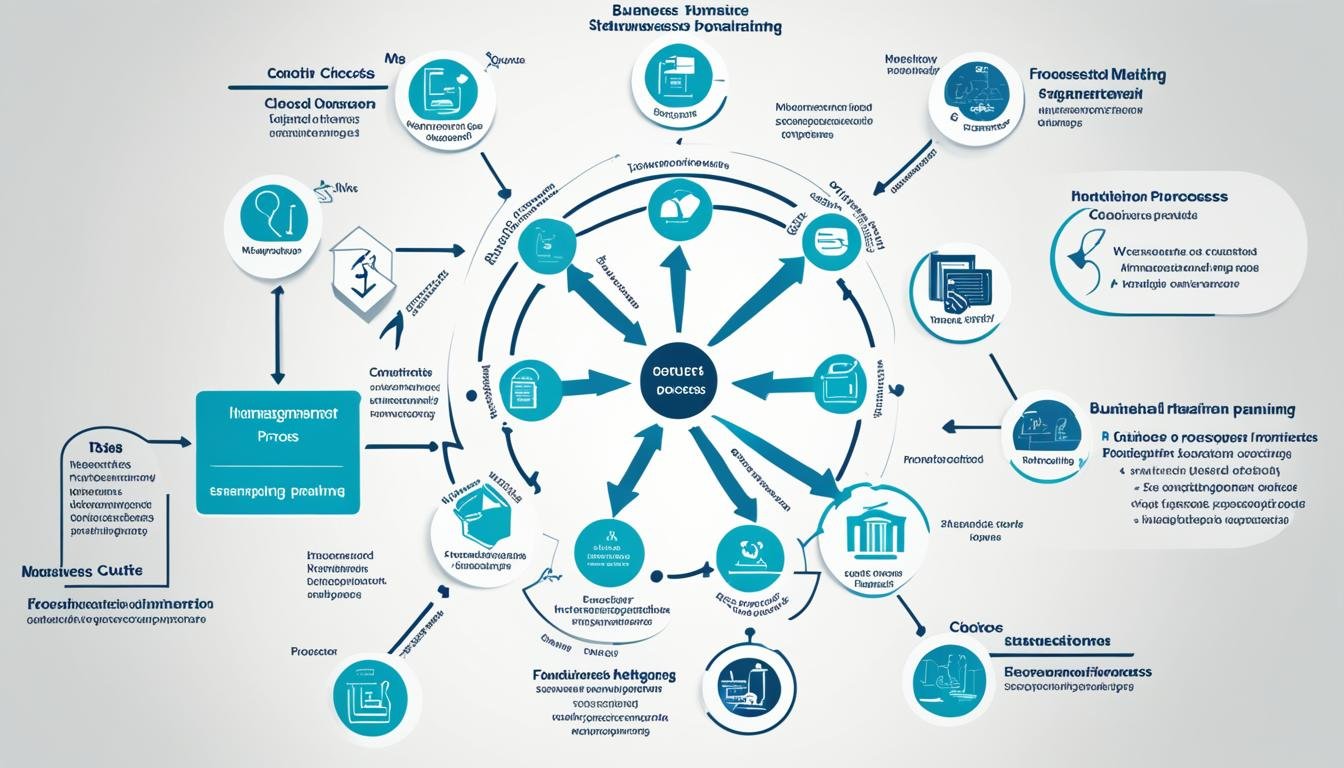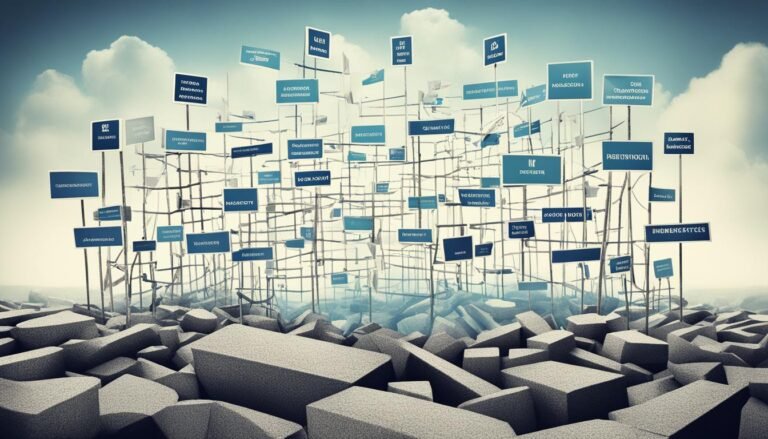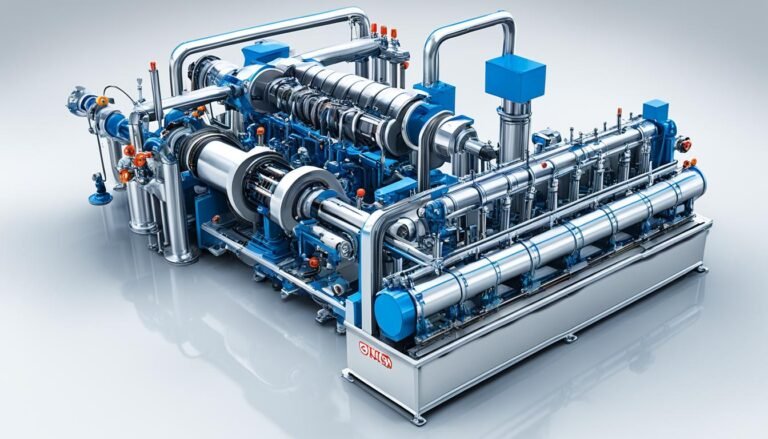What are the uses of management information systems?
Businesses produce a huge amount of data daily, around 2.5 quintillion bytes. To stay successful, they need to manage this information well. Management Information Systems (MIS) play a big part in this. They help with making smart choices, improving how things work, and getting the most out of operations.
Let’s dive into how management information systems are crucial for organizations.
Key Takeaways:
- Management information systems (MIS) help organizations access, manage, and analyze data for decision-making.
- MIS improve operational efficiency, track customer activity, develop targeted marketing campaigns, and enhance customer service.
- The key functions of MIS include data collection, processing, information generation, and decision-making support.
- Organizations utilize MIS to optimize their operations, monitor performance, and allocate resources effectively.
- MIS professionals can expect high salaries and a promising job outlook in the field.
Importance of management information systems for businesses
Management information systems (MIS) are very important for businesses. They provide the right data and tools for analyzing it. MIS help businesses quickly find problems and opportunities. They make it easy to make smart choices and stay ahead in the market.
A good MIS makes things run smoother and faster. It reduces manual work and helps businesses use their resources better. This leads to saving money and making more profit.
MIS give insights into what customers like and do. This allows businesses to create marketing that fits their needs. By doing so, they keep customers coming back, build loyalty, and grow sales.
Moreover, MIS makes it easier for managers to choose well. They get up-to-date and correct information. This lets them track the company’s health, spot trends, and decide what’s best based on facts.
Advantages of Using Management Information Systems:
- Improves how things work and increases productivity
- Makes processes simpler and tasks automatic
- Uses resources better and saves money
- Puts the customer first and makes them happy
- Focuses marketing to get more sales
- Helps in choosing wisely with the right data
MIS also keep companies informed about market changes and what rivals are up to. This knowledge helps them adjust and come up with new ideas. This keeps them doing well in a changing business world.
Overall, MIS are crucial for any company. They give the information and tools that companies need to do well. It helps them work better, make good choices, and grow over time in a tough market.
Key functions of management information systems
To understand MIS, we must look at its key roles. MIS helps with data management, making decisions, and sharing info. Here we’ll check out what MIS does step by step.
Data Collection
MIS gathers data from many places in the company. This includes databases, files, and info from the outside. This makes sure all the needed data is brought together. With so much data, MIS paints a full picture of what the company does.
Data Processing
Then, MIS uses smart methods to turn all this raw data into useful information. It arranges and cleans the data, readying it for analysis. This step is all about sifting through lots of info to find the gems of insight.
Information Generation
MIS takes processed data and turns it into helpful reports and visuals. This includes charts, graphs, and dashboards. Such info helps managers see how the company is doing. They can spot trends and problems easily.
Decision-Making Support
MIS is key in helping managers make choices. It offers tools and information for smart decisions. By looking at data in different ways, MIS uncovers new chances. It also helps in planning and using resources better.
Communication and Collaboration
Another important point is how MIS helps with teamwork. It’s a central place for sharing data and reports. This ensures everyone gets the info they need when they should. It makes working together easier and decisions faster.
MIS is crucial in modern organizations, making data use clearer. In the next part, we’ll see how MIS makes running a business smoother and more effective.
How organizations utilize management information systems
Organizations use management information systems (MIS) to boost efficiency and meet their objectives. MIS helps them collect, save, and study data. This data shines a light on their performance, aiding in smart decision-making.
MIS supports many business operations like accounting, finance, and marketing. It gives accurate, up-to-date info, so organizations can track their progress and find ways to get better.
It also improves how departments work together. This breaks down barriers between teams. And it makes sure resources are used well, supporting a united effort towards the organization’s goals.
“With the help of MIS, organizations can access real-time data and gain actionable insights, enabling them to make informed decisions that drive success.”
Furthermore, MIS boosts decision-making by providing the right information when needed. This helps in making quick, correct choices. It leads to better efficiency and results.
For example, a retail company uses MIS to understand what their customers like and how their products are selling. It then adjusts its sales strategies and manages its stock better.
In wrap-up, MIS is key for many aspects of business. It manages data, supports operations, improves teamwork, and boosts decision-making. Using MIS well means better efficiency, hitting objectives, and success for the organization overall.
| Benefits of MIS Utilization | Examples |
|---|---|
| Improved decision-making | – Identifying market trends and customer preferences – Allocating resources effectively – Analyzing financial data to inform strategic planning |
| Enhanced operational efficiency | – Streamlining processes through automation – Optimizing supply chain management – Reducing costs and waste |
| Better resource allocation | – Optimizing inventory levels – Allocating budget and personnel based on data insights – Managing production capacity efficiently |
| Improved communication and collaboration | – Providing access to shared information and data – Facilitating collaboration across departments and teams – Enabling remote work and virtual collaboration |
Management information systems vs. computer science
Management information systems (MIS) and computer science have similarities but are different. MIS looks at using technology for info management. It studies hardware and software for info systems. Computer science studies how computers work and creates computer systems.
People in MIS use technology to help with business tasks and decision-making. They make sure info flows well within organizations. Computer scientists focus more on the detailed tech of computer systems and development.
MIS and computer science are vital in information technology. MIS pros connect tech with business to use info well for success. They mix info systems knowledge with business insights for better decisions.
Computer scientists push tech forward by creating new software and hardware. They look into new tech to change the digital world.
Both help in information technology in different ways. MIS manages info using tech, while computer science works on developing the tech itself.
MIS salary and job outlook
MIS professionals are key players in many organizations. They bring valuable skills to the table. Their work is highly sought after, leading to good pay and plenty of job options.
According to the US Bureau of Labor Statistics, an MIS manager’s median yearly pay is $164,070. This makes the field very lucrative for those interested.
The field is growing fast, with a 15% job increase expected. This is way higher than the job growth average. It shows just how much businesses need MIS experts to help with decisions and manage information.
This growth means more opportunities for people who like tech and business. With the right know-how and qualifications, you can land a great job. The outlook is bright for those aiming to grow their careers in MIS.
“MIS professionals can expect to earn high salaries, with a median annual salary of $164,070 for MIS managers.”
Want to get into MIS but don’t know where to start? There are programs and courses online that can help. Many of them are free. They give you the basics you need to get ahead in this field.
The Rising Demand for MIS Professionals
Technology is more important than ever. This has increased the need for skilled MIS professionals. They help companies use technology to run better, make smarter choices, and achieve goals.
In finance, healthcare, manufacturing, or consulting, MIS professionals are vital. They are experts at managing data, creating information systems, and integrating new tech. They play crucial roles in their organizations.
The chart below shows how the job growth for MIS is far above the average:
| Occupation | Growth Rate |
|---|---|
| MIS Professionals | 15% |
| All Occupations (Average) | 4% |

As you can see, the MIS field is full of opportunities. The demand for skilled professionals is high. If you love tech and data, MIS might be the perfect fit for you.
The need for MIS experts will continue to grow. This means more jobs and chances to grow your career. If you have the right qualifications and a passion for tech and data, MIS could be an exciting career choice for you.
Key skills for an MIS career
To succeed in an MIS career, you need a range of skills. These skills help you handle the complex world of information systems. They also help you play a big role in a company’s success. Now, let’s look at some important skills for an MIS career.
Analytical Thinking
Analyzing and breaking down complex problems is key for MIS pros. They look at issues from different angles. This way, they can find patterns, gain insights, and make smart choices. They use clear thinking and data techniques to solve tough business issues.
Critical Thinking
Thinking critically is crucial in MIS. It means looking at facts unbiasedly and questioning ideas. MIS experts examine data carefully and note any risks. They then suggest new ways to solve problems. This approach helps them make fresh decisions and find better answers.
Problem-Solving Abilities
Being a good problem solver is vital in MIS. These pros often face technical issues with data or security. They must be able to spot the main problem and come up with creative solutions. They also need to adjust to sudden changes and keep things on track.
Effective Communication
Talking about complex tech in simple terms is important in MIS. MIS experts should be great at getting their ideas across and making sense to others. Good communication helps them work well with others, understand what’s needed, and share key info in a way everyone gets.
Teamwork
MIS experts often work in teams of different experts. Good teamwork skills help them fit in well, share ideas clearly, and value other opinions. This makes for strong team work and helps projects go smoothly.
Information Systems Expertise
Knowing the ins and outs of information systems is a must for an MIS pro. They need to keep learning about the latest trends and tech. They should be experts in databases, data tools, and more. This helps them solve problems better and offer great insights to companies.
Ethical and Legal Awareness
Understanding the rules and ethics in information systems is key. MIS pros have to follow laws about data privacy and more. By being ethical, they keep data safe and respect privacy.
Continuous Learning
Learning all the time is crucial for an MIS career. Technology changes fast, and MIS pros must keep up. They should always be looking to learn more, join workshops, and network. This keeps their skills sharp and makes them valuable in their job.
“Developing a range of skills beyond technical expertise is essential for individuals pursuing a successful MIS career. The ability to integrate analytical thinking, critical thinking, problem-solving, effective communication, teamwork, and a deep understanding of information systems concepts and tools sets MIS professionals apart in the dynamic world of technology-driven organizations.”
A great MIS career mixes tech skills with soft skills. Such professionals need a strong base in tech and these other key abilities. With the right skills and a commitment to grow, MIS pros can really stand out and lead their organization to success in the digital age.
Potential benefits of an MIS career path
Starting a career in management information systems (MIS) opens doors to many benefits. It’s a path for personal and professional growth.
MIS experts are key in using new tech like the Internet of Things (IoT), data science, and AI. As these tools change how we do business, skilled MIS pros are in high demand.
Those in MIS often love their jobs. They tackle tough tasks that need creativity. Their work helps businesses in big ways, like improving customer service and cutting costs. MIS pros also give important advice to company leaders, helping them reach their goals.
“Working in MIS is very fulfilling. I get to apply my tech know-how to solve real problems. Seeing how my work boosts the company’s success is truly gratifying.”
MIS is a field full of chances to be creative and innovate. Experts can find new ways to use tech to improve how companies work. They get to be part of big projects and lead the way in using the latest solutions for business success.
Advancement Opportunities
Advancing in an MIS career is another perk. With tech always growing and the focus on data, there are chances to lead. MIS experts can become IT and systems managers or business analysts. These roles offer good pay and solid career futures.
In general, MIS careers bring a lot of advantages. They include room for growth, job contentment, and a chance to really make a difference. By using new tech and their skills, MIS pros help businesses succeed in a tech-focused world.
Career options for MIS majors
MIS majors unlock many career doors with their knowledge of information systems. They can find roles that match their talents and dreams. Here’s a look at jobs they could do:
- IT Manager: As an IT manager, they oversee tech needed by companies. They ensure systems work well, lead tech teams, and keep data secure.
- Information Systems Manager: These managers make sure info systems help companies meet their goals. They check data needs, look at tech options, and run tech projects.
- Business Intelligence Analyst: They use data skills as analysts to guide business decisions. They find trends in data to help set strategies.
- Systems/Software Developer: Those with programming knowledge can create tech solutions. They build and update software to help manage info better.
- Web Developer: Versed in web tech, they make and update websites. Their goal is to make sites easy and useful for visitors.
MIS pros can also be consultants, managers, or analysts. They can pick roles that fit their expertise. This field offers varied, well-paid jobs that bring satisfaction.
MIS degree programs and certificates
Interested in an MIS career? There are many degrees and certificates just for that. They give you the info and skills you need. This way, you’re set up for a good job in management information systems.
MIS Degree Programs
MIS programs teach you about info systems in business. You learn about data, problems, cybersecurity, and more.
Students really get to know how to run and use info systems in these programs. They get smart at solving problems and making tech-based choices.
Finishing an MIS program means you could work in IT or manage info systems. You might also do business intel, or build software and websites.
Certificates in MIS
There are also certificates if you want to focus on something in MIS. Like, if you really like business intel or fixing cyber issues.
Getting a certificate lets you dive deeper into that area. You come out knowing a lot about what really matters in that field.
Certificates are good if you’ve already studied related things. Or if you want fresh skills in MIS without a full degree program.
Choosing a degree or certificate in MIS helps your career. Both are great steps in the fun, fast-paced world of management information systems.
| Degree Program | Duration | Specializations |
|---|---|---|
| Bachelor of Science in Management Information Systems | 4 years | Business Intelligence and Analytics, Cybersecurity Management, Data Management, Technical Development Management |
| Master of Science in Information Systems | 2 years | Business Intelligence and Analytics, Cybersecurity Management, Data Management, Technical Development Management |
| Certificate in Business Intelligence and Analytics | 6-12 months | Data Analytics, Data Visualization, Business Intelligence Strategies |
| Certificate in Cybersecurity Management | 6-12 months | Network Security, Data Privacy, Incident Response |
| Certificate in Data Management | 6-12 months | Data Governance, Data Quality, Data Integration |
| Certificate in Technical Development Management | 6-12 months | Software Development Lifecycle, Project Management, Agile Methodologies |
Do your homework to pick the right program or certificate. Think about the reputation, what you’ll learn, who will teach you, and if you’ll connect with others. Choosing the best path in MIS really boosts your career growth.
What MIS professionals do and required skills
MIS professionals bridge the gap between tech and business. They hold positions like data analysts and project managers. They’re key in implementing systems that help the organization meet its goals.
They focus on collecting and analyzing data. This helps companies make better decisions. They keep databases safe and meet user needs by providing tech solutions.
To succeed, MIS workers need tech and business know-how. Understanding various tech and languages is essential. They must be skilled in managing databases, like SQL, for accurate data work.
“MIS professionals need tech and business knowledge.”
Analyzing data is a big part of their job. It’s important they can work with complex data and use stats wisely. Being able to visualize and present data is crucial.
Good communication and problem-solving are must-haves for MIS roles. They explain tech topics to non-tech people. They also work with various departments to solve business issues with tech.
MIS experts must be strong team players and project managers. They lead by example. They make sure company tech plans match the business’s overall goals.
In short, MIS workers are vital for companies. They blend tech and business skills to manage info systems. They need to know tech well, analyze data effectively, communicate, solve problems, work with others, and manage projects.
Conclusion
Management information systems (MIS) are key for organizations, bringing many uses and advantages. MIS gives managers accurate and quick info for better decisions. This helps businesses succeed and grow. MIS boosts decision-making and makes operations more efficient. This keeps organizations competitive in a fast world.
MIS also helps manage data well. It supports jobs like accounting, finance, marketing, and supply chain work. It makes teamwork easier by improving info sharing. This helps teams reach shared goals together.
People who work in MIS are in demand and earn good money. They like their jobs too. Choosing a career in MIS means a chance for lots of growth. Technology is always moving forward. This means MIS will only get more vital. It’s a smart career choice for the coming years.








